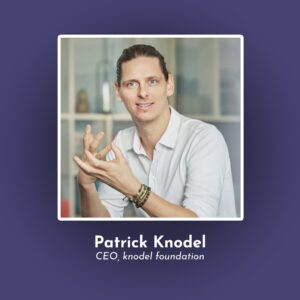
Show Summary
On this episode, Nate is joined by impact investor Patrick Knodel to discuss how philanthropy and non-profit work might make positive change beyond the superficial level. The power of understanding the values and lived realities of other cultures is often overlooked but is central to finding meaningful interventions and support. Through connecting with people across the globe, Patrick has a deep sense of how to create projects that span beyond single issues, and support the autonomy of communities while preserving the land they inhabit. What does it mean to be constantly learning and questioning what you think you know – and why is it important? Is it possible to change the system from within, shifting away from growth and power paradigms perpetuated by our current institutions? How can we develop worldviews that transcend mainstream narratives and work towards true awareness of the big picture around us?
About Patrick Knodel
Patrick Knodel is the CEO of the knodel foundation, an impact investing firm which focuses on projects that increase sustainability and autonomy for the Global South. He also directs the investments for purpose driven and impactful startups through PANDION INNOVATION for IMPACT GmbH. Patrick has a background in economics and entrepreneurship, but his worldview and drive for non-profit projects has been shaped through his travels. Through all of his work he listens, learns, and tries to influence people with regards to issues around wealth, war, and humanity.
In French, we have a motto that says that a simple drawing is often better than a long explanation. Jean-Marc Jancovici Carbone 4 President
That’s very understandable because with left atmosphere thinking, one of the problems is that you see everything as a series of problems that must have solutions. Iain McGilchrist Neuroscientist and Philosopher
We can’t have hundreds and hundreds of real relationships that are healthy because that requires time and effort and full attention and awareness of being in real relationship and conversation with the other human. Nate Hagens Director of ISEOF
This is the crux of the whole problem. Individual parts of nature are more valuable than the biocomplexity of nature. Thomas Crowther Founder Restor
Show Notes & Links to Learn More
Download transcript00:00 – Patrick Knodel info, knodel foundation
06:45 – Palm oil
19:37 – Impact investing
21:30 – Philanthropy
24:24 – There are more slaves today than in all of human history
25:59 – Indian Caste system, Narenda Modi
26:15 – History of the Indian continent
29:10 – Sex trafficking
37:55 – Varieties of rice most commonly eaten globally, varieties of native rice in India
39:50 – Agroforestry
41:03 – Harms of pesticides
41:22 – Animism
47:15 – Kabakoo Academies
49:27 – Downsides of western materialism
52:15 – 2100 population and demographic/geographic projections
53:40 – King of Queens
59:40 – Neoliberalism
1:01:48 – King Leopold
1:05:30 – Studies looking at the differences between men and women
1:06:51 – Megan Rapinoe, gender pay gap in sports
1:08:25 – Care economy
1:12:45 – Marc Gafni, Zak Stein, Post-tragic
1:22:44 – Hans Rosling, Gapminder
1:29:31 – Largest polluter in the world is the pentagon
1:29:57 – NATO accounts for 80% of military spending in Ukraine






